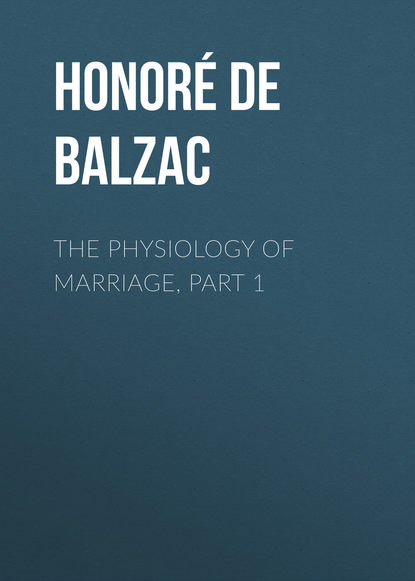 Полная версия
Полная версияThe Physiology of Marriage, Part 1
In that case, the system adopted by the Romans could advantageously be applied to the married women who when they were girls used their liberty. Being exclusively engaged in the early education of their children, which is the most important of all maternal obligations, occupied in creating and maintaining the happiness of the household, so admirably described in the fourth book of Julie, they would be in their houses like the women of ancient Rome, living images of Providence, which reigns over all, and yet is nowhere visible. In this case, the laws covering the infidelity of the wife should be extremely severe. They should make the penalty disgrace, rather than inflict painful or coercive sentences. France has witnessed the spectacle of women riding asses for the pretended crime of magic, and many an innocent woman has died of shame. In this may be found the secret of future marriage legislation. The young girls of Miletus delivered themselves from marriage by voluntary death; the senate condemned the suicides to be dragged naked on a hurdle, and the other virgins condemned themselves for life.
Women and marriage will never be respected until we have that radical change in manners which we are now begging for. This profound thought is the ruling principle in the two finest productions of an immortal genius. Emile and La Nouvelle Heloise are nothing more than two eloquent pleas for the system. The voice there raised will resound through the ages, because it points to the real motives of true legislation, and the manners which will prevail in the future. By placing children at the breast of their mothers, Jean-Jacques rendered an immense service to the cause of virtue; but his age was too deeply gangrened with abuses to understand the lofty lessons unfolded in those two poems; it is right to add also that the philosopher was in these works overmastered by the poet, and in leaving in the heart of Julie after her marriage some vestiges of her first love, he was led astray by the attractiveness of a poetic situation, more touching indeed, but less useful than the truth which he wished to display.
Nevertheless, if marriage in France is an unlimited contract to which men agree with a silent understanding that they may thus give more relish to passion, more curiosity, more mystery to love, more fascination to women; if a woman is rather an ornament to the drawing-room, a fashion-plate, a portmanteau, than a being whose functions in the order politic are an essential part of the country's prosperity and the nation's glory, a creature whose endeavors in life vie in utility with those of men – I admit that all the above theory, all these long considerations sink into nothingness at the prospect of such an important destiny! —
But after having squeezed a pound of actualities in order to obtain one drop of philosophy, having paid sufficient homage to that passion for the historic, which is so dominant in our time, let us turn our glance upon the manners of the present period. Let us take the cap and bells and the coxcomb of which Rabelais once made a sceptre, and let us pursue the course of this inquiry without giving to one joke more seriousness than comports with it, and without giving to serious things the jesting tone which ill befits them.
1
The foregoing queries came in (untranslatable) alphabetic order in the original. – Editor



